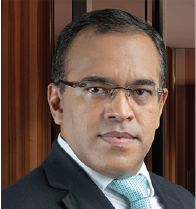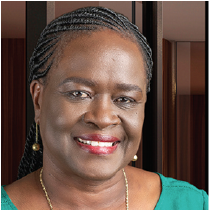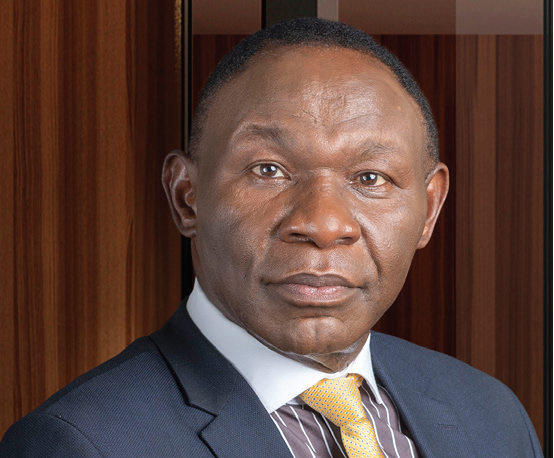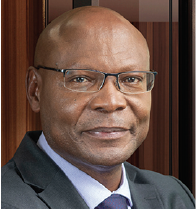
Chairman and Non-Executive Director

Chief Executive Officer and Executive Director

Non-Executive Director

Chief Financial Officer and Director (Alternate to Bob Collymore)

Chief Executive Officer (Interim) and Director

Chief Corporate Security Officer

Alternate to Henry RotichChief Technology Officer

Non-Executive Director

Company Secretary

Non-Executive Director

Independent Non-Executive Director

Independent Non-Executive Director
The constitution of the company’s Board is stipulated by the company’s Articles of Association. It comprises of 10 Directors of whom 9 are Non-Executive Directors and 1 is an Executive Director
KEY

Chief Executive Officer (Interim)

Chief Financial Officer

Chief Customer Officer

Chief Corporate Affairs Officer

Chief Enterprise Business Officer

Chief Corporate Security Officer

Chief Technology Officer

Chief Special Projects Officer

Chief Financial Services Officer

Chief Human Resources Officer

Chief Business Development Officer
Last year was a challenging one for businesses around the country. Despite reported positive economic growth, consumer wallets remained under pressure, forcing Kenyans tomake tougher spending decisions every day.
This lower discretionary spending, coupled with increased tax demands as the Government sought to raise more funds from the ICT sub-sector, contributed towards the plateauing in growth of a number of services including voice and messaging. Despite this, the service industry continued to register sturdy performance, supported by the growth of businesses such as ours in ICT, as well as wholesale and retail trade, transport, tourism and real estate
As mobile penetration has deepened to reach close to 51 million subscribers in a country of about 52 million, so has the need to find alternative means of sustaining growth. Traditional growth drivers (voice and messaging) continue plateauing, pointing to the urgency of reinventing our business to meet changing consumer needs. This will require more calculated investment and innovation, both of which can only succeed in a supportive regulatory environment. We have noted with concern, attempts to regulate the industry through proposed legislation and regulations that seek to forcefully reorganise the operating structure of companies such as ours, whose growth has been the result of well-executed business strategy.
Such actions would severely limit the ability of businesses to invest, innovate and transform lives, which is what Safaricom exists to do. It is our hope that this matter will be handled in a more consultative manner, including meaningful discussions between all concerned parties in order to come to a more considered outcome, that's beneficial to all stakeholders.
Kenya is a dynamic market, with enough room for multiple players to compete fairly in the pursuit of business growth and brand love.
It is therefore encouraging to see the competition landscape changing, owing to the ongoing merger between two market players. We believe this will result in greater innovation and efficiencies for the benefit of customers. Safaricom welcomes fair competition on a fair playing ground, where investment, strategy, innovation and brand promise are the true differentiators; as opposed to the use of regulatory support as a means to success.
Over the last 18 years, Safaricom has built a business founded on our innate desire to transform lives using mobile technology. We have been able to do this by focusing on our strategy, continuously anticipating the needs of our customers and innovating to meet them and staying true to our purpose.
However, none of this would have been possible without your unwavering belief in our vision. So on behalf of the Board of Directors, I would like to say, thank you. Your patience, loyalty and support inspire us to do more: to seek out new growth opportunities that will generate considerable shareholder wealth, and deliver shared value to a broader stakeholder base.
We began Q2 FY2020 on a sad note following the passing of our CEO, Mr. Bob Collymore, on 1st July, 2019 after a long battle with cancer. He was a remarkable man who had an extraordinary dream for the world and for Safaricom.
For nine years, Mr. Collymore led our business to achieve notable milestones, including significantly increasing shareholder value and instilling in us a sense of purpose that has become the hallmark of what we do at Safaricom. This purpose, to transform lives, is the reason we exist today. To honour his legacy, we will remain committed to completing the work he began. We will stay true to our purpose and to using mobile technology to make life better for Kenyans and as many people as we can reach across the world.
Although our business is up against a number of challenges, we are confident in our ability to manage these risks and ensure continued growth, guided by a very able Executive Committee now headed by Mr. Michael Joseph, who was appointed as the interim CEO by the Board of Directors.
Looking ahead, we will continue to reinvent our business, invest in new areas of growth and realign our priorities to position Safaricom as a business that is fit for the future.
Nicholas Nganga | Chairman


The Board of Directors is responsible for the governance of the Company. The Company has instituted systems to ensure that high standards of corporate governance are maintained at all levels of the Company.
We remain committed to the highest standards of corporate governance and business ethics. Good corporate governance practices are essential to the delivery of long term and sustainable stakeholder and shareholder value. Safaricom continues to endeavour to comply with the provisions of the Capital Markets Authority (CMA) Code of Corporate Governance Practices for Issuers of Securities to the Public 2015 (the Code).
Over and above the self-assessment that the Company completed of its level of compliance of the Code as at March 31 2019, the Corporate Governance Statement as provided in this Annual Report will highlight to the Company’s shareholders and various stakeholders, the performance to date.
Besides complying with the Code, the Company has committed to embed internal rules of engagement to support corporate governance. These internal guidelines are constituted in the Code of Business Conduct to which every employee, supplier and the Board makes a commitment to comply with.
The Company also adheres to other regulations promulgated by the CMA and the Nairobi Securities Exchange and the ethical standards prescribed in the Company Code of Conduct. In addition, Safaricom abides by the tenets of the Constitution of Kenya and all other laws as a law-abiding corporate citizen.
We operate a mature risk management framework that is aligned with the ISO 31000 International Risk Management Standard. This ensures our strategic and operational risks are identified, managed, assured and reported in a consistent way. It is an evolving framework as we continually seek to improve and enhance our risk management processes and designed to be responsive to the ever-changing environments in which we operate.
We continually seek to improve and enhance our risk management processes and designed to be responsive to the ever-changing environments in which we operate.
We continue to be committed to robust risk management practices as an integral part of good management. This is demonstrated by the top down approach with the Board taking overall responsibility of managing risk. Appropriate support toward risk management is given, driving a positive risk culture across the organization.
We identify the key risks through our Principal Risks Framework, which provides the Executive Committee and Board with a robust assessment of the principal risks facing the Company. An embedded enterprise risk management process supports the identification of these principal risks. The risk appetite for each principal risk is reviewed and approved by the Board to enable informed risk-based decision-making.
© 2025 - Safaricom